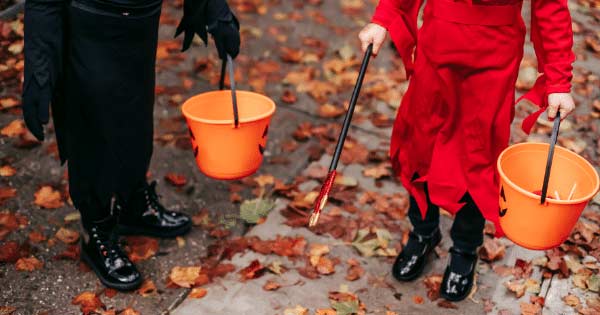Follow Us on Social Media!
See what we are doing in your community and stay up-to-date on contests, giveaways, and more by following us on all of our social media channels.
See what we are doing in your community and stay up-to-date on contests, giveaways, and more by following us on all of our social media channels.

Get ready for a scary good time! Halloween is nearly here and kids everywhere will be out trick-or-treating. Remember a safe Halloween is a Happy Halloween; make sure your children are out and about in a way that they can be easily seen.
The ghosts and goblins (or more likely known as little trick-or-treaters) come out after the sun has gone down. Which is fun when you’re behind the mask, but not so fun if you are behind the wheel. When it’s dark, it’s harder for drivers to see pedestrians in the street. Add to that, excited children who may run out suddenly, and the results could be tragic. In fact, children are twice as likely to be hit by a car on Halloween than on any other day of the year.
That’s why it’s important to decide carefully on the costume your child will wear to ensure he/she is the most visible. And before they leave the house, you’ll also want to go over important pedestrian safety rules. You may even decide that accompanying your child is the best thing to do (recommended for children under 12).
Here are some more Halloween safety tips to consider for every vampire, witch, and werewolf!
Tip #1: Use reflective tape on your child’s costume.
Increase your child’s chances of being seen by adding pieces of reflective tape to his/her costume and/or jacket. Do so creatively and you may have a skeleton with glowing bones or a superhero with a gleaming emblem. Reflective tape works by reflecting light back, so wearers will be easily seen in a car’s headlights even in the pitch dark.
Tip #2: Add a glow stick or a clip-on light.
Decorate your child’s costume or candy bag with clip-on lights. These can be Halloween-themed lights or any small clip-on. Consider giving your child glow stick bracelets or necklaces; these are a festive, fun, and bright addition to any costume.
Tip #3: Select costumes with light colors.
Darker color costumes may be spooky but they are hard to see when it gets dark. When possible, choose lighter-colored outfits. If your child insists on a dark color, use tip #1 to lighten it up.
Tip #4: Choose face paint over masks.
Masks can block your child’s vision and depth perception. They also cover up your trick-or-treater’s face so it may not be easily seen. Face paint is a great alternative. You can even find glow-in-the-dark varieties for more visibility. Choose a face paint that is labeled safe for use with children. Test it on your child’s arm before Halloween. If you want a natural version, you can make homemade face paint.
Tip #5: Travel in groups and carry a flashlight.
Whether you walk around with your kids, or they travel with their friends, insist that they go in groups. Large groups – especially with both adults and children – are easier to see. If one or more group members carry a flashlight, that’s added protection. Having an adult also will help keep trick-or-treaters safe. The excitement of Halloween can overtake a child’s focus on safety.
Tip #6: Don’t walk and text.
You may often text while you’re walking but it’s not a good idea –and while supervising children on Halloween, it’s an especially bad idea. A study from Stonybrook University showed that we are 61 percent more likely to veer off course when we are walking and texting. Not only could you walk into traffic – or other people – or step off the curb, but your attention is distracted from the trick-or-treaters in your care.
Tip #7: Choose safe, lighted routes.
If you are able, choose a residential neighborhood with street lights and sidewalks for trick-or-treating. Walk on the sidewalk and cross at the corner, looking first for cars. If there are no sidewalks, and you need to walk in the street, you should keep to the left and walk facing cars. This will ensure you see cars coming toward you. Halloween is not the time to jaywalk; it can be especially dangerous. Do not walk out between cars, and definitely do not run into the street for any reason.
Tip #8. Watch for cars.
Watch for cars that are turning corners or pulling out of driveways. They could surprise you if you’re not expecting them—and you could surprise them by being in their path. If you’re the one driving at night on Halloween, look out for pedestrians.
For more safety tips, see our blogs on Halloween fire safety and Halloween safety tips for pets.
Have a Happy Halloween!
This article is furnished by California Casualty, providing auto and home insurance to educators, law enforcement officers, firefighters, and nurses. Get a quote at 1.866.704.8614 or www.calcas.com.
Our team at California Casualty remains focused on the appreciation, motivation, and recognition of our amazing employees.
As an organization over a century old, family-owned, and steeped in tradition, we know that honoring the drive and accomplishments of our workforce makes a difference to you, to us, and especially to them.
Every employee is essential to the success of our organization. And in this Behind the Scenes, we take a look at our Customer Service Department and their efforts to continually build a strong team of insurance professionals.

Through our Emerging Leaders program, we have identified the technical and behavioral competencies necessary to be successful in a Customer Service leadership role. We aligned these competencies with a curriculum and a tracking guide that our Team Managers use when leading development planning sessions.
This curriculum utilizes both internal resources and professional designations such as the Associate in Insurance Services designation offered by The Institutes Risk & Insurance Knowledge Group.
In 2021, we rolled out a self-paced individual study program consisting of articles, book summaries, reflection pages, and collaboration groups. The program has been well-received and continues to grow.
In the last year, we’ve been honored to watch a few of our brightest stars earn promotions within the company. Tonya Turentine and Meredith Savage were promoted to Service Team Managers, Darrah Zinn to Rating and Underwriting Systems Analyst, and Amber Ferrell and Alyson Proctor to Learning and Development Instructors.
We also have several others working through a development plan to become the next generation of Senior Customer Care Specialists.
To see more California Casualty employees celebrated for their role in our organization, please visit: https://bit.ly/3v5TCvd
This article is furnished by California Casualty, providing auto and home insurance to educators, law enforcement officers, firefighters, and nurses. Get a quote at 1.866.704.8614 or www.calcas.com.
We have amazing employees at California Casualty. The New Employee Spotlight is a series aiming to highlight the talented individuals that are brand new to our team. Please help us give them a warm welcome!
Today we’re spotlighting New Customer Care Specialist, Elena Chavez
Let’s get to know Elena!

What California Casualty office do you work in?
Arizona
Where are you from?
Native to Arizona 🙂
What is one interesting fact you want us to know about you?
I can speak Gibberish
If you could eat one food for the rest of your life, what would it be?
Tacos
What do you like to do on the weekends?
Watching movies
Playing board games
Watching my kid play soccer
What made you want to start your new career with California Casualty?
I had a career in the insurance industry before and missed it. Lucky enough to come back to be a part of this company.
If you want to learn more about Elena or are interested in a career at California Casualty, connect with her on LinkedIn! Or visit our careers page at https://www.calcas.com/careers

Fire safety comes in many forms- drills, procedures, seminars, dedicated months/weeks, etc. But nothing prepares you for the scare of an unplanned fire alarm, especially when you are in the classroom. No matter what, when you are a teacher, your students are your first priority. It’s the extra effort that you put in as a teacher that ensures everyone stays safe during an emergency, like a fire.
In honor of Fire Safety Month, we wanted to share why and when fires happen in schools, and what else you can do to encourage fire safety.
A Brief History of School Fire Safety
On March 4, 1908, a fire broke out at the Lake View School in Ohio. There was only one staircase in the four-story building with no fire doors or exits. Between the oiled floors and the wood interior, the fire quickly caught and trapped students and staff inside, ultimately killing 172 students, 2 teachers, and a rescuer.
That tragedy did more than just make headlines. It changed the face of fire safety in schools and public buildings. As a result, today’s schools have fire escapes and exit plans, sprinkler systems and alarms, and even push bars on exit doors – rather than doorknobs — for easy access to the outside.
School Fire Trends
Schools may not have oiled floors anymore but they do have plenty of flammable materials; furniture, paper, cooking materials, electric cords, and even chemicals in the science lab.
Whether as a result of these hazards or something else, there were an average of 3,230 school fires annually from 2014-2018, according to the National Fire Protection Association.
Prevention and preparedness are key to staff and students staying safe in the event of a fire.
Fire Safety Checklist for Your Classroom
You can set the stage for fire safety with your students in your classroom. Here’s how.
Fire Safety Checklist for Your School
Fire safety is a schoolwide effort. You may wish to share this checklist with your school administrator.
Fire Safety Checklist for the College Dorm
College is when students are on their own for the first time. Share this list with your college-age son or daughter to keep fire safety top of mind.
You may not be able to predict when a fire will break out, but you can anticipate it and practice fire safety- at home and in the classroom.
Stay prepared, stay safe.
This article is furnished by California Casualty, providing auto and home insurance to educators, law enforcement officers, firefighters, and nurses. Get a quote at 1.866.704.8614 or www.calcas.com.